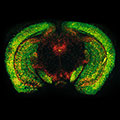The American College of Neuropsychopharmacology (ACNP) has named Lorenzo Leggio, M.D., Ph.D. as the winner of the Eva King-Killam Research Award. Dr. Leggio is a Clinical Investigator and Section Chief for the NIAAA and NIDA Intramural Research Programs (IRPs). He also serves as Associate Director for Clinical Research for the NIDA IRP Medication Development Program…. [Read More]
News Main
Deletion of the type 2 metabotropic glutamate receptor increases heroin abuse vulnerability in transgenic rats.
Featured Paper of the Month – February 2019
Published in Neuropsychopharmacology by Gao, Jun-Tao; Jordan, Chloe J; Bi, Guo-Hua; He, Yi; Yang, Hong-Ju; Gardner, Eliot L; Xi, Zheng-Xiong
Despite extensive research in the past decades, little is known about the etiology of opioid addiction. In this study, Xi and colleagues found that genetic deletion of mGluR2, a glutamate receptor subtype, in rats caused an increase in brain dopamine responses to heroin and in opioid reward, facilitating the development of opioid use and abuse. This finding suggests that low-mGluR2 expression in the brain may be a risk factor for the development of opioid abuse and addiction…
A deeper insight into how GABA-B receptor agonism via baclofen may affect alcohol seeking and consumption: lessons learned from a human laboratory investigation.
Hot Off the Press – January 29, 2019. The GABA-B receptor agonist baclofen has been investigated and used as a treatment for alcohol use disorder, but data from clinical studies remain inconsistent. Additional research is needed to understand the biobehavioral mechanisms underlying baclofen’s effect in relation to alcohol use. In the present study, thirty-four alcohol-dependent… [Read More]
Expression of immediate early genes in brain reward circuitries: Differential regulation by psychostimulant and opioid drugs.
Reviews To Read – January 2019. Although some of the clinical manifestations of substance use disorders might be superficially similar, it is highly likely that different classes of abused drugs including opioids (heroin, morphine, and oxycodone, other opioids) and psychostimulants (cocaine and amphetamines) cause different neuroadaptations in various brain regions dependent in the distribution and concentration of their biochemical… [Read More]
AP-MALDI Mass Spectrometry Imaging of Gangliosides Using 2,6-Dihydroxyacetophenone.
Featured Paper of the Month – January 2019
Published in Journal of the American Society for Mass Spectrometry by Jackson, Shelley N; Muller, Ludovic; Roux, Aurelie; Oktem, Berk; Moskovets, Eugene; Doroshenko, Vladimir M; Woods, Amina S
Gangliosides are complex glycosphingolipids and have been implicated in brain development, neuritogenesis, memory formation, synaptic transmission and aging. Disruptions in ganglioside metabolism has been linked to several diseases such as Niemann-Pick C, and Gaucher disease types II, Alzheimer disease and Guillain-Barre syndrome. GD1s are the most abundant ganglioside species in the mammalian brain and consist of two structural isomers, GD1a and GD1b.Traditionally, the only way to analyze these isomers by mass spectrometry involved extraction and thus the researcher loses information about the location of the isomers in tissue…
NIDA IRP Welcomes Brenda Curtis, Ph.D.
NIDA welcomes Brenda L. Curtis, PhD who joined the IRP on January 7th as a new Investigator (Tenure-Track) within the Clinical Pharmacology & Therapeutics Research Branch (CPTRB). Dr. Curtis will lead a cutting-edge clinical research program as the Principal Investigator of the Technology and Translational Research Unit. Dr. Curtis earned both a bachelor’s degree in… [Read More]
Ventral midbrain astrocytes display unique physiological features and sensitivity to dopamine D2 receptor signaling.
Featured Paper of the Month – December 2018
Published in Neuropsychopharmacology by Xin, Wendy; Schuebel, Kornel E; Jair, Kam-Wing; Cimbro, Raffaello; Biase, Lindsay M De; Goldman, David; Bonci, Antonello
Astrocytes are ubiquitous CNS cells that support tissue homeostasis through ion buffering, neurotransmitter recycling, and regulation of CNS vasculature. Yet, despite the essential functional roles they fill, very little is known about the physiology of astrocytes in the ventral midbrain, a region that houses dopamine-releasing neurons and is critical for reward learning and motivated behaviors. Using a combination of whole-transcriptome sequencing, histology, slice electrophysiology, and calcium imaging, Xin et al. performed the first functional and molecular profiling of ventral midbrain astrocytes and observed numerous differences between these cells and their telencephalic counterparts, both in their gene expression profile and in their physiological properties…
Genetic deletion of vesicular glutamate transporter in dopamine neurons increases vulnerability to MPTP-induced neurotoxicity in mice.
Hot Off the Press – November 29, 2018. The neural mechanisms underlying dopamine neuron degeneration in Parkinson’s disease are largely unknown. In this study, we found that selective deletion of a vesicular glutamate transporter (VgluT2) in dopamine neurons led to a significant increase in dopamine neuron toxicity to the neurotoxin MPTP via a BDNF-dependent mechanism,… [Read More]
Science-Based Actions Can Help Address the Opioid Crisis.
Reviews To Read – November 29, 2018. This commentary on the opioid crisis was written by two NIDA IRP investigators (clinical investigator David Epstein and preclinical investigator Yavin Shaham), along with former Clinical Director Markus Heilig. It challenges misconceptions about the nature of the crisis, and it suggests solutions that are–as the authors say–“probably not… [Read More]
Volitional social interaction prevents drug addiction in rat models.
Hot Off the Press – November 19, 2018. A new study published in Nature Neuroscience finds that social interactions can have a profound effect on behaviors related to addiction, and on the brain’s response to drug-associated cues. These findings have implications for people with substance use disorders (SUDs), because it suggests that social interaction can… [Read More]










